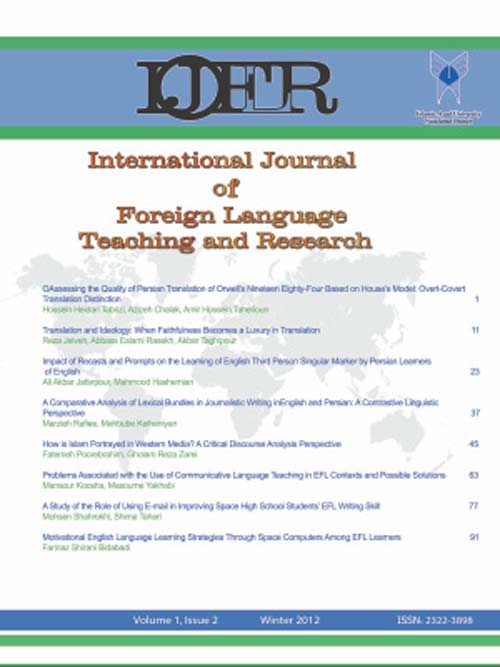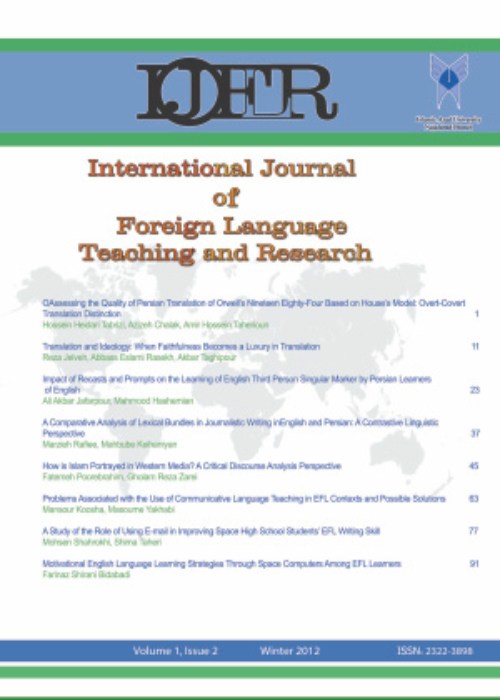فهرست مطالب

International Journal of Foreign Language Teaching and Research
Volume:5 Issue: 17, Spring 2017
- تاریخ انتشار: 1395/12/03
- تعداد عناوین: 9
-
Pages 11-24This study examined the effects of cooperative learning techniques (CLT) on vocabulary achievement of reflective/impulsive Iranian EFL Learners. From among 130 students at Fajr institute in Dehdasht, Kohkiloyeh and Boyer Ahmad Province, Iran, 90 participants were selected based on their performance on the Oxford Placement Test (OPT). The participants were then divided into two experimental groups (comprising reflective learners and impulsive learners) and one control group labeled as conventional instruction (CI) group. The instrument used to divide the participants into reflective and impulsive groups was the Eysencks (1990) Impulsivity Questionnaire. The experimental groups were taught with the student team achievement division (STAD) technique, while the control group was taught through the traditional method for ten weeks. To measure the vocabulary knowledge of the learners in different groups at the beginning and at the end of the experiment, a pretest and a posttest, each consisting of 40 items on new English words based on their book were used. Independent-Samples and paired-samples t tests were used to determine whether there were significant inter- and intra-group differences. The statistical analysis of the results showed that the experimental groups (reflective and impulsive) performed better on vocabulary achievement posttest than the control group (CI), and also it was revealed that reflective learners performed better on vocabulary achievement than impulsive learners. In sum, cooperative learning enhanced learners vocabulary performance, especially the reflective ones.Keywords: Cooperative learning, EFL learners, impulsive, reflective, STAD, vocabulary achievement
-
Pages 25-33This study aims to investigate the semantic and syntactic features of verbs used in the introduction section of Applied Linguistics research articles published in Iranian and international journals. A corpus of 20 research article introductions (10 from each journal) was used. The corpus was analysed for the syntactic features (tense, aspect and voice) and semantic meaning of verbs. The findings showed that in both groups of introductions, the common tenses were the present and past, rather than future. In introductions published in the international journal, the present tense was used more often than in those published in the Iranian journal, whereas past tense was used twice as frequently in Iranian journal introductions. Regarding the aspect of verbs, the simple aspect was common in both groups of introductions, but more frequent in Iranian journal introductions. The perfect aspect was more common in international journal introductions. Concerning voice, the active voice was predominant in both groups of introductions. Semantically, verbs with mental, activity, communication and existence meanings were common in both groups. The semantic meanings of verbs were not significantly different in the two groups of introductions. The findings of this study can have implications for novice, non-native writers in Applied Linguistics in helping them design and write more appropriate research article introductions.Keywords: verb, tense, aspect, voice, semantic meaning, syntactic analysis
-
Pages 35-44In spite of the importance of teacher's motivation only a limited number of studies have been conducted on teacher's demotivation in Iran. This study was an attempt to investigate demotivating factors among Iranian EFL language institute teachers in terms of years of teaching experience. To this end, the researchers tried to utilize a questionnaire as a research method. To collect data, a validated questionnaire was administered to a sample of 77 English teachers who were teaching in Iranian language institutes in Najafabad, Isfahan, Iran. A convenience sampling was used in this study. The data were classified and analyzed based upon the relevant research questions. The one-way between-groups ANOVA conducted on demotivating factors showed that there was a significant difference between professional development and other domains of demotivating factors among the groups of English teachers. Moreover, it was uncovered that insufficient income was among the most crucial factors providing dissatisfaction for Iranian EFL teachers in the field of teaching process. Therefore, it is important for educational institution to improve teachers perceptions of their job through improving job environment and condition or payments to manage language learner institutes better than before.Keywords: Teacher's demotivation, teacher's motivation, extrinsic, intrinsic motives
-
Pages 45-55The purpose of this study was to investigate the impact of weblog task assessment on Iranian EFL learners reading ability. To this purpose, a group of 30 English language students (both male and female) in Rozaneh Language Institute in Najafabad were selected based on their performance on the OPT. The researchers tried to select a homogeneous sample in terms of age factor and proficiency level. The homogeneous students were randomly assigned to experimental and control groups. With the exception of the control group, both experimental groups received treatment. Group A received journalist tasks and group B received mystery tasks. The experimental groups were treated through a weblog designed by the present researchers. Before performing the treatment, all participants were tested to estimate their reading ability. At the end of the experiment, the participants took another test on reading comprehension. The scores of the tests were analyzed and interpreted using ANOVA. The findings revealed that the journalist and mystery tasks groups outperformed the control group. However, the mystery task proved more effective. The findings of the study can be very beneficial for the teachers of English who wish to improve Iranian EFL learners reading ability. Actually, blogs enable us to exploit learning as a natural part of everyday life.Keywords: Weblog, reading ability, proficiency level, journalist tasks, mystery tasks
-
Pages 57-75This study investigates the effect of four types of oral corrective feedback, namely, explicit elicitation, implicit elicitation, explicit recast and implicit recast on the most commonly mispronounced phonological features among Iranian EFL learners through immediate uptake and retention. Five classes were randomly categorized into four experimental groups and one control group, each with 18 intermediate-level male learners. The treatment was conducted in the form of a retelling task in nine sessions. During the feedback sessions, the learners uptake was recorded. The learners retention was also perused in one immediate and one delayed post-test. The results revealed that those learners who received explicit recast obtained the highest score in terms of correct uptake, and that the groups performed differently across different time periods. The learners scores enhanced over time; however, the increase then leveled off and even dropped in the delayed post-test in all the experimental groups except for the group which received explicit elicitation, apparently leading to more retention of the target phonological features. The study offers insights to teachers regarding the effect of recast and elicitation in their explicit and implicit form on L2 pronunciation.Keywords: Corrective feedback, recast, elicitation, uptake, retention
-
Pages 77-87Nowadays computers are increasingly being incorporated into school curriculums and serious games are occupying the educational games markets. This article addressed the integration of serious games as tools for learning and teaching English in Iranian schools to zero-beginner students. An experiment was concluded using Computer Assisted Language Learning (CALL) to investigate the effectiveness of using serious games; namely, Mingoville English as an educational aid and also to examine parents, students and instructors attitudes towards using serious games. To this end, 60 female students were chosen and divided into two groups. The control group was taught in the conventional way and the experimental group received the educational aiding material Mingoville, a web-based serious game program, as the treatment. The results of the analyses revealed that the experimental group outperformed the control group as the method of teaching was changed. The study also showed the willingness of children, their parents, and teachers toward using such games. It can be concluded that using serious games such as Mingoville can be regarded as an effective tool in teaching English to Iranian EFL children at schools and language institutes. The study can benefit teachers and heads of institutes to add serious games as aiding instructional materials to their English classes.Keywords: Attitude, CALL, Iranian EFL children, Mingoville English, serious games
-
Pages 89-103This study was conducted to identify self-directed and external professional development obstacles facing primary school EFL teachers in Southern Zone of Tigray Region in Ethiopia. The participants of the study were 63 primary school EFL teachers, 10 school principals and 2 clusters of supervisors. School teachers were selected using random sampling technique whereas school principals and cluster supervisors were selected by using purposive sampling. To gather data for the study, questionnaires and semi-structured interview were used. The results of the study revealed that lack of interest, having dissatisfaction in their job, unattractive salary, lack of knowledge and skills in doing action research and misunderstanding of the concept of CPD and how to do it were the major self-directed obstacles of professional development activities. The study also revealed that in adequate in-service training, supervisors lack of knowledge, skills and expertise in teaching English as a foreign language, work load, and lack of support and recognition from stakeholders were the major external obstacles of professional development.Keywords: external professional development obstacles, primary school EFL teachers, self- directed professional development obstacles
-
Pages 105-119This research chiefly focused on the application of mitigation strategies and traditional form of feedback in writing development of the fifth semester University students majoring in TEFL and English Translation fields based on Vygotskys sociocultural theory in general and the notion of Zone of Proximal Development in particular. To that end, this study relied on a pre-posttest experimental design which was mediated by different written types of feedback such as mitigation strategies vs. error correction to find out if any gains in writing development of participants could be achieved. It is to be noted that participants of this inquiry were 125 fifth semester university students who were chosen and assigned to four experimental and one control groups. The materials of this study consisted of a textbook called Writing Power by Nancy White (2002) that the teacher taught during the course of instruction; a standard writing test of IELTS (2007) as a pretest; another standard writing test of IELTS (2007) as a posttest. The results showed that although homogeneity among the groups was observed on the pretest, writing scores of those groups which received corrective feedback and paired comments outscored those of the other groups. On the other hand, the interrogative forms and personal attributions had the least increase from the pretest to the posttest. Hence, it is recommended that some teacher training courses regarding the appropriate use of these strategies be held in educational settings in a way that teachers can apply these techniques in the best possible ways in their writing classes.Keywords: Mitigation strategies, sociocultural theory, writing proficiency
-
Pages 121-135Many factors may be involved in determining why some students are more and some are less proficient in language. This study tried to explore the factors affecting Iranian EFL learners proficiency. 221 students at second, third and fourth year of university, including 50 male and 171 female were selected randomly to participate in the study. A researcher-made questionnaire and a proficiency test comprised the data collection instruments. The researchers were able to identify three factors affecting language proficiency. They were classified as social factors, cultural factors and linguistic factors, Then a model was developed to represent the relationship among these factors and language proficiency. In line with Bourdieus (1986), the results of data analysis indicated that social factors are among the most dominant factors affecting the learners language proficincy.Keywords: Social factors, cultural factors, linguistic factors, Confirmatory Factor Analysis, Structural Equation Modeling


